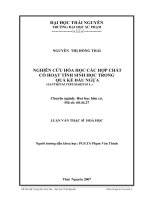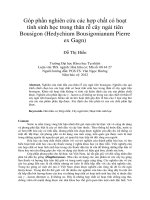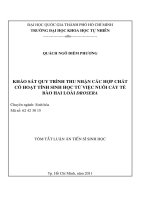DSpace at VNU: Nghiên cứu các hợp chất có hoạt tính sinh học trong cây ngải tiên ( Hedychium coronarium Koenig)
Bạn đang xem bản rút gọn của tài liệu. Xem và tải ngay bản đầy đủ của tài liệu tại đây (220.86 KB, 5 trang )
Nghiên cứu các hợp chất có hoạt tính sinh học trong
cây ngải tiên ( Hedychium coronarium Koenig)
Nguyễn Thị Mai Phương
Trường Đại học Khoa học Tự nhiên, Khoa Hóa học
Luận văn ThS Chuyên ngành: Hoá hữu cơ; Mã số: 60 44 27
Người hướng dẫn: PGS.TS. Văn Ngọc Hướng
Năm bảo vệ: 2011
Abstract: Nghiên cứu tinh dầu của thân rễ cây ngải tiên. Nghiên cứu qui trình
chiết chọn lọc các hợp chất có hoạt tính sinh học trong thân rễ cây ngải tiên. Khảo
sát hoạt tính kháng vi sinh vật kiểm định của tinh dầu và các sản phẩm chiết được.
Nghiên cứu phân lập các y không no trong các cặn chiết từ thân rễ cây ngải
tiên., - lacton Xác định cấu trúc phân tử của các chất phân lập được và khảo
sát hoạt tính chống ung thư của chúng.
Keywords: Hóa hữu cơ; Cây ngải tiên; Chất hữu cơ; Hợp chất sinh học
Content
Hóa học các hợp chất thiên nhiên với vai trò nghiên cứu thành phần hóa học và tìm hiểu
hoạt tính sinh học của cây thuốc mang ý nghĩa khoa học và thực tiễn. Việc nghiên cứu các hợp
chất có hoạt tính sinh học trong cây thuốc dân tộc là vấn đề không những hấp dẫn về khoa học
mà còn đóng góp cho việc sử dụng cây thuốc có hiệu quả hơn, chính xác hơn.
- Thu thập các tài liệu về chi Hedychium và tổng quan chi tiết về cây ngải tiên Hedychium
coronarium Koenig.
- Thu nhận tinh dầu ngải tiên bằng phương pháp chưng cất lôi cuốn hơi nước được hiệu suất
0,117%. Kết hợp với phương pháp GC – MS đã xác định được thành phần hóa học trong tinh
dầu thân rễ ngải tiên. Một số chất có hàm lượng cao là: Linalool: 23,44%; α-Terpineol: 12,14%;
Nerollidol : 11,86%; 1,8- cineole 2.23%; Terpinol-4-ol: 2.12%.
- Xây dựng quy trình chiết – phân lớp các hợp chất có hoạt tính sinh học bằng các dung môi
thích hợp thu được 2 cặn chiết: Cặn H ( trong dung môi n- hexan) và cặn E (dung môi etyl
axetat).
- Khảo sát hoạt tính sinh học với 3 mẫu: tinh dầu, cặn H và cặn E đối với các vi sinh vật kiểm
định:
Vi khuẩn Gr (+): E.coli, P.aeruginosa.
Vi khuẩn Gr (-) : B.subtillis, S.aureus.
Nấm mốc
: Asp.niger, F.oxysporum.
Nấm men
: C.albicans, S.cerevisiae.
Kết quả cho thấy tinh dầu kháng được ba loại vi khuẩn: Ecoli và 2 loại vi khuẩn nấm mốc:
Asp.niger và F.oxysporum; còn cặn H và cặn E đều cho kháng F.oxysporum.
- Từ cặn chiết Etyl axetat phân lập được 2 chất là P7(Villosin) và P5 (Coronarin D) . Hai chất
này đều là labdan diterpen lacton có hàm lượng lớn và là những chất có hoạt tính ức chế mạnh
sự phát triển của nhiều dòng ung thư khác nhau.
- Tiến hành thử hoạt tính gây độc tế bào với chất P5 (Coronarin D) có hoạt tính ức chế mạnh sự
phát triển của 3 dòng ung thư người là ung thư gan Hep-G2 ( IC50 0,78 microgam/ml), ung thư
phổi Lu (IC500,96 microgam/ml) và ung thư cơ vân tim RD ( IC500,67 microgam/ml).
References
TIẾNG VIỆT
1.
Đỗ Huy Bích, Đặng Quang Chung, Bùi Xuân Chương, Nguyễn Thượng Dong,
Đỗ Trung Đàm, Phạm Văn Hiển, Vũ Ngọc Lộ, Phạm Duy Mai, Phạm Kim Mãn et al.
(2004), Cây thuốc và động vật làm thuốc ở Việt Nam, tập I, Nxb KH&KT Hà Nội, tr.
141-143.
2.
Bộ Y tế (2002), Dược điển Việt Nam, Nxb. Y học, Hà Nội, tr. 141.
3.
Võ Văn Chi (1997), Từ điển cây thuốc Việt Nam, Nxb Y học, TP HCM, tr. 821.
4.
Phạm Hoàng Hộ (1993) Cây cỏ Việt Nam, NXB Montreal, tâ ̣p 3, tr. 558 – 562.
5.
Nguyễn Thị Thuỷ, Nguyễn Thị Phương Thảo, Trương Anh Thư, Bùi Văn Thanh
(2003)― Thành phần hoá học của tinh dầu Ngải tiên (Hedychium coronarium
Koenig)‖, Viện Sinh thái & Tài nguyên Sinh vật, Viện KH& CNVN.
TIẾNG ANH
6.
Aziz M. A., Habib M. R., Karim M. R., (2009) ― Antibacterial and Cytotoxic
Activities of Hedychium coronarium J. Koenig‖ , Research Journal of Agriculture
and Biological Sciences, 5(6), pp. 969-972.
7.
Boukouvalas J., Wang Jian-Xin and Marion O., (2007) ― Expedient synthesis of
villosin and its isomer (E)-labda-8(17),12,14-trien-15(16)-olide‖, Tetrahedron
Letters,48, pp. 7747–7750.
8.
Chimnoi N, Pisutjaroenpong S, Ngiwsara L, Dechtrirut D, Chokchaichamnankit D,
Khunnawutmanotham N, Mahidol C, Techasakul S., (2008) ― Labdane diterpenes
from the rhizomes of Hedychium coronarium‖, Natural Product Research, 22(14),pp.
1249–1256.
9.
Csurhes, S., Jones M.N, (2008) Pest plant risk assessment, Biosecurity Queensland
Department of Primary Industries and Fisheries, Queensland , pp. 8.
10.
Itokawa H, Morita H, Katou I, et al. (1987) ― Cytotoxic diterpenes from the rhizomes
of Hedychium coronarium‖, Planta Med,54, pp. 311.
11.
Itokawa H, Morita H, Takeya K, Motidome M.(1988) ― Diterpenes from rhizomes of
Hedychium coronarium‖, Chem Pharm Bull Tokyo,36, pp. 2682–4,54, pp. 311–5.
12.
Joshi S, Chanotiya CS, Agarwal G, Prakash O, Pant AK, Mathela CS, (2008)
―
Terpenoid Compositions, and Antioxidant and Antimicrobial Properties of the
Rhizome Essential Oils of Different Hedychium Species‖, Chemistry & Biodiversity,
5, p. 299.
13.
Joy, P. P., Thomas J., Mathew, S., and Skaria, B. P., (1998), Zingiberaceous
Medicinal and Aromatic Plants, Aromatic and Medicinal Plants Research Station,
Odakkali, Asamannoor P.O.,Kerala, India, pp. 23 – 24.
14.
Joy B, Rajan A, Abraham E., (2007) ― Antimicrobial activity and chemical
composition of essential oil from Hedychium coronarium‖, Phytother Res, 21(5), pp.
439 – 443.
15.
Phan Van Kiem , Nguyen Thi Kim Thuy , Hoang Le Tuan Anh , Nguyen Xuan
Nhiem , Chau Van Minh , Pham Hai Yen , Ninh Khac Ban , Dan Thuy Hang, Bui
Huu Tai, Nguyen Van Tuyen , Vivek Bhakta Mathema , Young-Sang Koh , Young
Ho Kim, (2011) ― Chemical constituents of the rhizomes of Hedychium coronarium
and their inhibitory effect on the pro-inflammatory cytokines production LPSstimulated in bone marrow-derived dendritic cells‖ , Bioorganic & Medicinal
Chemistry Letters,21 pp. 7460–7465
16.
Kumrit I, Suksamrarn A, Meepawpan P, Songsri S, Nuntawong N., (2010)
―Labdane-type diterpenes from Hedychium gardnerianum with potent cytotoxicity
against human small cell lung cancer cells‖, Phytother Res , 24(7), pp. 1009-13.
17.
Kunnumakkara AB, Ichikawa H, Anand P, Mohankumar CJ, Hema PS, Nair MS,
Aggarwal BB., (2008) ―Coronarin D, a labdane diterpene, inhibits both constitutive
and inducible nuclear factor-kappa B pathway activation, leading to potentiation of
apoptosis, inhibition of invasion, and suppression of osteoclastogenesis‖, Mol Cancer
Ther,7 (10), pp. 3306-17.
18.
Li R. and Fan Y., (2011) ―Molecular Cloning and Expression Analysis of a
Terpene Synthase Gene, HcTPS2, in Hedychium coronarium‖, Plant Molecular
Biology Reporter, 29, pp. 35–42.
19.
Liu X.H., Zhao D.B., Yang C.R., Wang H.Q., (2000) ―New Sesquiterpenoids from
Hedychium yunnanense Gagne‖,Chinese Chemical Letters,11(11), pp. 1009−1012.
20.
Lu Y., Zhong C. X., Wang L., Lu C., Li X. L. and Wang P. J., (2009), ―Antiinflammation activity and chemical composition of flower essential oil from
Hedychium coronarium‖, African Journal of Biotechnology,8 (20), pp 5373-5377.
21.
Mabbertey D.J., (1998), The Plant-Book: A Portable Dictionary of the Higher
Plants, Cambridge University Press, Cambridge
22.
Matsuda H., Morikawa T., Sakamoto Y., Toguchida I. and Yoshikawa M., (2002) ―
Labdane-type Diterpenes with Inhibitory Effects on Increase in Vascular Permeability
and Nitric Oxide Production from Hedychium coronarium‖, Bioorganic & Medicinal
Chemistry,10, pp. 2527–2534.
23.
Morikawa T, Matsuda H, Sakamoto Y, Ueda K, Yoshikawa M., (2002) ―New
Farnesane-Type Sesquiterpenes, Hedychiols A and B 8,9-Diacetate, and Inhibitors of
Degranulation in RBL-2H3 Cells from the Rhizome of Hedychium coronarium‖,
Chem. Pharm. Bull,50(8), pp. 1045—1049
24.
Nakamura S, Okazaki Y, Ninomiya K, Morikawa T, Matsuda H, Yoshikawa M,
(2008) ―Medicinal flowers. XXIV. Chemical structures and hepatoprotective effects
of constituents from flowers of Hedychium coronarium‖, Chem. Pharm. Bull,56(12),
pp. 1704—1709.
25.
Nakatani N., Kikuzaki H., Yamaji H., Yoshio K., Kitora C., Okada K., Padolina
W.G., (1994) ―Labdane diterpenes from rhizomes of Hedychium coronarium‖
Phyrochmustry,37(5), pp. 1383-1388.
26.
Oh S, Jeong IH, Shin WS, Lee SA.(2003) ―Study on the synthesis of antiangiogenic
(+)-coronarin A and congeners from (+)-sclareolide‖, Bioorg Med Chem Lett, 13, pp.
2009 –12.
27.
Phillipine Medicinal Plants www.stuartxchange.org/Kamia.html
28.
Qing Z., Xin H., Yun S.W, Cheng Z., HAO X.J., (2003) ―Two New Diterpenoids
from Hedychium forrestii‖, Chinese Chemical Letters,14(11), pp. 1141 – 1143.
29.
Sabulal, B. George, V., Dan, M., Pradeep, N.S. (2007), ―Chemical composition and
antimicrobial activities of the essential oils from the rhizomes of four Hedychium
species from South India‖, Journal of essential oil research,19, pp. 1-5.
30.
Sirirugsa, P. & Larsen K. (1995), ―The genus Hedychium (Zingiberaceae) in
Thailand‖ , Nordic Journal of Botany,15(3), pp. 301–304.
31.
Shrotriya S, Ali MS, Saha A, Bachar SC, Islam M.S., (2007) ―Anti-inflammatory
and analgesic effects of Hedychium coronarium Koen‖, Pak. J. Pharm. Sci., 20(1),
pp. 42-47.
32.
Suresh G., Reddy P. P., Babu K.S., Shaik T B, Kalivendi S. V., (2010), ―Two new
cytotoxic labdane diterpenes from the rhizomes of Hedychium coronarium‖,
Bioorganic & Medicinal Chemistry Letters, 20, pp. 7544–7548
33.
Taveira F.N., Oliveira1 A.B., Souza Filho J.D., Braga F.C, (2005) ―Epimers of
labdane diterpenes from the rhizomes of Hedychium coronarium J. Koenig‖, Revista
Brasileira de Farmacognosia, Brazilian Journal of Pharmacognosy, 15(1), pp. 55-59.
34.
Valkenburg J. L. C. H. van & Bunyapraphatsara N,(2002) ―Plant resource of South –
east asia‖, Medicinal and poisonous plants ,12(2).









